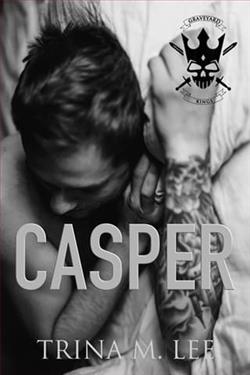Page 61 of Lady Audacious
Reuben could see that Odile was a mixture of curiosity and offended sensibilities, which was entirely understandable.
‘His father was the Earl of Prestwick’s younger son.’
‘Oh good heavens!’ Odile touched her lips with the fingers of one hand.
‘I am not acquainted with them,’ Reuben said.
‘They are a minor Scottish aristocratic family. I myself have never met them. Our father was disowned when he married Mama, who was a keen amateur botanist from a respectable middle-class family whom he met at a scientific lecture. His father deemed her quite unsuitable and forbade the match, so Papa was disowned. And before you ask, she was an only child, her parents are dead. We are all that’s left.’
‘My name is not Aspen?’
‘It is, actually. As is mine, but I changed it as a precaution. Peabody is my wife’s maiden name.’
‘You keep talking of precautions,’ Odile replied crossly, ‘but have yet to explain what these precautions were or why they were deemed necessary.’
‘I am getting to that.’ He splayed his legs, rested his forearms on his knees and stared at the floor beneath his feet. ‘It’s difficult. Delicate.’
‘Then let me make it easier for you,’ Odile replied, her eyes flashing with anger. ‘Our parents were making drugs that harmed people and were running away for some reason when their carriage overturned because they were driving too fast, hoping to outrun their pursuers. The death of our parents was not enough to satisfy whoever was chasing them, so they turned their wrath upon you, which is why you changed your name. As a ten-year-old I am absolutely certain that I was blameless, so why I needed to be hidden away from the only family member I had left is less obvious to me.’
Reuben admired her spirit and the quick manner in which her brain had connected the fragments of information they possessed at a time when she must be feeling dazed, angry and neglected.
‘You have it partly right. Mama and Papa married and dedicated themselves to using their knowledge of flora and fauna for the greater good. They wanted to help people by creating a more sophisticated stillroom, if you like, than you would find in most grand houses. They charged very little, sometimes nothing at all, for their cures.’ He fixed a probing gaze upon Odile. ‘They were idealists with good intentions, but they ran short of funds and they were obliged to become more commercially-minded. And so they set up a small establishment, much like my own,’ he added, pointing to the floor and his premises beneath it, ‘but still didn’t charge enough to make ends meet.
‘Then Quintin Smythe came into our lives, which is when everything changed. Smythe was a decade older than our father, and he was a botanist of limited ability. He was, first and foremost, a salesman who was quick to spot an opportunity. He had seen the increasing popularity of natural cures, especially when the king, in his madness, turned to them for relief, making such remedies both fashionable and popular. He promised our parents that he could sell as many of their products as they were able to produce, and he was as good as his word. For a few years our fortunes prospered.’
Peabody paused to clear his throat and, Reuben suspected, to choose his next words with care. They were getting to the crux of the matter and he would have to explain his neglect of Odile. ‘Then Smythe told Papa that their future was secure since he had been approached by a man of influence whose son was in a lunatic asylum. He had heard about the advances being made in ointments that relieved addled minds. They had failed with the king, but as I say advances had been made.’
‘Deadly nightshade,’ Odile breathed.
Peabody sent her a look of respect. ‘Mama said that you had a natural affinity with herbs,’ he said. ‘Papa was full of reservations about Smythe’s offer. He knew he would be entering controversial and mostly untried territory, but his intellect was piqued and he never could resist a challenge. Smythe had filled his garden at Fox’s Reach with deadly herbs, providing the raw materials with which our father experimented. He eventually produced an ointment that when absorbed through the skin caused hallucinations, lightness of mind and the sensation of flying like a bird. Basically, it relieved anxiety and left those who took it in a calmer, more rational frame of mind.’
‘Incredible,’ Reuben said, not intending his comment as a compliment.
‘It had promising results when tested on soldiers traumatised by recollections of the battles they had fought in. That had to be a good thing,’ Peabody said defensively, leaning forward as though anxious for assurances that were not forthcoming.
Odile seemed absorbed with her brother’s tale, yet Reuben sensed her underlying disapproval.
‘It proved very successful with some patients, and demand outstripped supply,’ Peabody explained. ‘Our parents worked day and night to keep up, but others had jumped on the bandwagon without understanding what they were doing. They were encouraged by Smythe, I have always suspected but could not prove, whose greed knew no bounds.’
‘I have never heard of such a miracle cure,’ Reuben said sceptically.
‘Exactly. That was part of Smythe’s genius—or his evil, depending upon your point of view. He knew the process could be dangerous. Our father warned him that the ointment would react in different ways with different people, according to the degree of their mental conditions, but Smythe didn’t care and Papa was in too deep to pull out. He knew others were trying to replicate his cures and that there was less chance of people dying if he kept overall control. As I say, I was finishing university at the time and was well aware of what was going on. I didn’t like it but I knew how stretched the parents were financially and I had added to their burden by being a student rather than working to earn my keep. And they had Odile’s future to consider.’
‘Ah, so this was my fault?’
‘Of course not. Never think that. You were loved, cherished and very much wanted.’
‘What happened for it to end in disaster?’ Odile asked breathlessly.
‘Our parents wanted stability. They intended to purchase a property and then withdraw from Smythe’s operation, which had expanded beyond their control. Smythe had of necessity lived a reclusive life in Amberley. He couldn’t let anyone know what he was really doing. But the financial rewards had given him ideas of grandeur. He wanted to sell up and live the life of a gentleman in London.’
Reuben snorted, aware that gentlemen were born, not made.
‘Our parents purchased Fox’s Reach, but our father was a cautious man. He foresaw difficulties and didn’t want to be robbed of the security for his family that he had worked so hard and gone so much against his conscience to earn. So he purchased the property through a company he formed and had Sandwell administer it, keeping his name out of things altogether. Smythe, I subsequently discovered, had done the same thing, which gave our father the idea. It wasn’t an uncommon arrangement, and Father didn’t suppose that anyone would query it. Indeed, as far as I am aware, no one did.’
Odile’s eyes widened in shock. ‘Mr Sandwell knew all of this?’
‘Some of it, but he was sworn to secrecy. Anyway, a group of young aristocrats heard about the ointments and their hallucinatory properties. They decided they would be far more affordable than opium and much less addictive, although how they could have reached that conclusion is beyond me. Men with more daring than intellect on the lookout for a new sensation, one assumes. They wanted to be pathfinders among their aristocratic set, I have always thought. Young men of means but with insufficient tasks to occupy their time are often thus inclined. Suffice it to say that the son of an influential family reacted badly and died. He was his father’s only son and the father in question raised merry hell. He tracked Smythe down and demanded answers. Smythe, being the snake that he is, blamed it all on our parents, insisting that he sold their other, harmless cures but had nothing to do with the hallucinators.’















